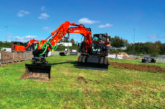With construction site accidents claiming 60,000 lives around the world every year – a figure dwarfed by the number who die from work-related illness – two courses have been launched to help businesses in the sector better protect workers.
The new courses, one designed for construction site managers and the other for workers, have been introduced by the Institution of Occupational Safety and Health (IOSH), the global chartered body for professionals responsible for worker protection.
Safety, Health and Environment for Construction Site Managers provides those in charge of projects with the ability to implement strategies designed to ensure workers and the environment aren’t harmed by projects. Meanwhile Safety, Health and Environment for Construction Workers is designed to ensure those working on the ground do not put themselves or colleagues at risk.
Both courses are being showcased at The Big 5, a construction sector event at the Dubai World Trade Centre, being held from 26-29 November. The courses, which can be tailored for different countries and individual organisations, will then be rolled out across the globe.
The annual cost to businesses of illness and deaths in construction is £2 trillion. The cost of accidents on sites significantly adds to this, but it is estimated up to 70 per cent of accidents can be prevented by good management standards. IOSH believes its new courses, which have been developed in consultation with leading organisations and individuals, will help to protect the construction workers of tomorrow, and reduce the cost of accidents and illness by up to 40 per cent.
Jonathan Nobbs, Head of Product at IOSH, said: “There’s no getting away from the fact that construction is a high-risk sector to work in, when you consider things like the use of machinery, working at height, long hours and outdoor working. While a high number of people are killed in construction site accidents, many more are becoming ill because of past exposure to harmful dusts and materials. This is unacceptable. No one should have their safety or health harmed by work.
“It is crucial, therefore, that organisations have strong, robust health, safety and environment practices. Our new courses are aimed to equip site managers and workers with the knowledge and ability to implement policies and procedures designed to save lives. They are flexible, meaning they can be tailored to suit the needs of an organisation, no matter where in the world they are.”
The manager-level course gives a clear overview of specific requirements for people at that level, including local law and enforcement, worker and contractor management, method statements, and the environment. The core skills course looks at issues such as site safety, incidents and reporting, and the environment.
Both courses are case study led. IOSH worked with members of its Construction sector group in their development, along with representatives of major firms relating to the sector and existing training providers. Among them was John Lacey, a former Chair of the Construction Group and past IOSH President.
He said: “These courses, by their design, can be applied to any areas and disciplines within a project, from planning and design to handover and occupation of the structure. Aimed at not only UK operations but also projects in other countries, the adaptability of the courses allow the trainer to tailor presentations for all audiences. I recommend them to advance the safety culture in all our industry sectors.”









